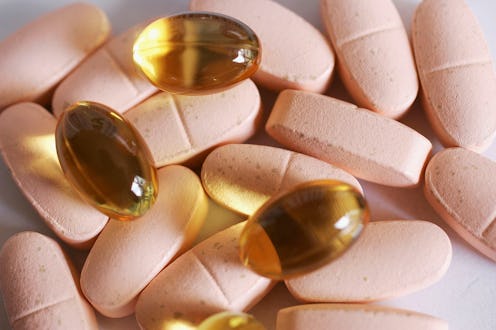News
Dietary Supplements Might Contain Fatal Stimulants
Ever wonder what's really in your favorite protein powder? Well, so did a team of Harvard scientists — and what they found wasn't very encouraging. A study published Wednesday reveals that popular retailers have been selling various dietary supplements that contain DMBA, or 1,3-dimethylbutylamine, if you want to get technical. So... what is that? Well, only a potentially dangerous stimulant. Though the Council for Responsible Nutrition (CRN) has raised this problem to the attention of the U.S. Food and Drug Administration (FDA), the regulating agency has yet to take action to reprimand the supplement manufacturers or remove the dangerous supplements from customer reach.
Pieter Cohen, an assistant professor at Harvard Medical School and the co-author of the recent DMBA study, has urged the FDA to remove the 12 offending supplements from retailer’s shelves, at least until DMBA’s effects on humans can be effectively determined in thorough experiments.
What’s so bad about DMBA in the first place? According to Cohen, DMBA — commonly listed on supplement ingredient lists as AMP Citrate — is a synthetic stimulant whose chemical structure closely resembles DMAA, a compound previously banned by the FDA for causing heart attacks, seizures, and neurological issues when consumed by humans. The FDA banned DMAA in 2012 after receiving numerous illness and death reports that were linked to consuming products containing DMAA. With that in mind, it's reasonable that scientists would be concerned when a DMAA-mimicking product started showing up in dietary supplements a mere two years after the harmful stimulant was removed from the market.
The DMBA-laden products that Cohen and his fellow researchers tested in their recently published study fell under a range of categories, marketed as sports nutrition supplements, weight loss aids, or even “brain enhancers.” A full list of supplements that tested positive for DMBA:
- Contraband (by Iron Forged Nutrition)
- Redline White Heat (Vital Pharmaceutical Inc.)
- Evol (Genomyx LLC)
- Preamp by Hybrid (DSEO, LLC)MD2 Meltdown (Vital Pharmaceutical Inc.)
- OxyphenXR AMP’D (Beta Labs, LTD)OxyTHERM Pro (deNOVOLABS)
- AMP Citrate (Genomyx LLC)
- Oxyfit XTreme (Oxyfit Xtreme)
- Synetherm (Synetherm)
- AMPitropin (Lecheek Nutrition)
- Decimate Amplified (Genomyx LLC)
- AMPiliean (Lecheek Nutrition)
- Frenzy (Driven Sports)
The concentration of DMBA varied significantly among the different supplements — where sports nutrition supplement “Evol” contains 13 mg of DMBA per serving, weight loss supplement “AMPilean” delivers an astounding 120 mg of DMBA per 2-capsule serving.
Perhaps the bigger problem, however, lies within the FDA’s somewhat blasé attitude towards the supplement scandal. Of all the aforementioned manufacturers that include DMBA in their supplements, none have yet taken the appropriate steps to file AMP Citrate (DMBA in disguise) as a new dietary ingredient with the FDA, which means that selling these products is technically illegal. This means that the FDA has the authority to expediently reprimand the offending manufacturers through product seizures, recalls, and consumer advisories. You would think that the FDA would jump to take action against the dangerous supplements, considering that their job is to protect and promote Americans’ health and well-being, right?
Yet, with all of these tools and legal support in their arsenal, the FDA has done little more than announce that it will “consider taking regulatory action.” Um, what?
Even if extensive research ends up revealing that DMBA is completely harmless, conducting the studies alone will have been well worth it — when you’re dealing with people and their health, a false alarm is preferable to blissful ignorance. And, when it comes down to it, the FDA should be the one calling the shots on what’s safe to include in American consumer products, not the manufacturing companies.
Images: Getty Images (4)
